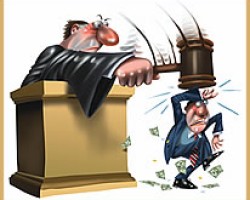
Now you know when the Law Offices of David J. Stern reaches the Wall Street Journal, we certainly are getting our point A C R O S S! Thank You AMIR!
LAW APRIL 16, 2010, 11:20 P.M. ET
Judge Bashes Bank in Foreclosure Case
By AMIR EFRATI
A Florida state-court judge, in a rare ruling, said a major national bank perpetrated a “fraud” in a foreclosure lawsuit, raising questions about how banks are attempting to claim homes from borrowers in default.
The ruling, made last month in Pasco County, Fla., comes amid increased scrutiny of foreclosures by the prosecutors and judges in regions hurt by the recession. Judges have said in hearings they are increasingly concerned that banks are attempting to seize properties they don’t own.
Case Documents
Cases handled by the Law Offices of David Stern
The Florida case began in December 2007 when U.S. Bank N.A. sued a homeowner, Ernest E. Harpster, after he defaulted on a $190,000 loan he received in January of that year.
The Law Offices of David J. Stern, which represented the bank, prepared a document called an “assignment of mortgage” showing that the bank received ownership of the mortgage in December 2007. The document was dated December 2007.
But after investigating the matter, Circuit Court Judge Lynn Tepper ruled that the document couldn’t have been prepared until 2008. Thus, she ruled, the bank couldn’t prove it owned the mortgage at the time the suit was filed.
The document filed by the plaintiff, Judge Tepper wrote last month, “did not exist at the time of the filing of this action…was subsequently created and…fraudulently backdated, in a purposeful, intentional effort to mislead.” She dismissed the case.
Forrest McSurdy, a lawyer at the David Stern firm that handled the U.S. Bank case, said the mistake was due to “carelessness.” The mortgage document was initially prepared and signed in 2007 but wasn’t notarized until months later, he said. After discovering similar problems in other foreclosure cases, he said, the firm voluntarily withdrew the suits and later re-filed them using appropriate documents.
“Judges get in a whirl about technicalities because the courts are overwhelmed,” he said. “The merits of the cases are the same: people aren’t paying their mortgages.”
Steve Dale, a spokesman for U.S. Bank, said the company played a passive role in the matter because it represents investors who own a mortgage-securities trust that includes the Harpster loan. He said a division of Wells Fargo & Co., which collected payments from Mr. Harpster, initiated the foreclosure on behalf of the investors.
Wells Fargo said in a statement it “does not condone, accept, nor instruct counsel to take actions such as those taken in this case.” The company said it was “troubled” by the “conclusions the Court found as to the actions of this foreclosure attorney. We will review these circumstances closely and take appropriate action as necessary.”
Since the housing crisis began several years ago, judges across the U.S. have found that documents submitted by banks to support foreclosure claims were wrong. Mistakes by banks and their representatives have also led to an ongoing federal criminal probe in Florida.
Some of the problems stem from the difficulty banks face in proving they own the loans, thanks to the complexity of the mortgage market.
The Florida ruling against U.S. Bank was also a critique of law firms that handle foreclosure cases on behalf of banks, dubbed “foreclosure mills.”
Lawyers operating foreclosure mills often are paid based on the volume of cases they complete. Some receive $1,000 per case, court records show. Firms compete for business in part based on how quickly they can foreclose. The David Stern firm had about 900 employees as of last year, court records show.
“The pure volume of foreclosures has a tendency perhaps to encourage sloppiness, boilerplate paperwork or a lack of thoroughness” by attorneys for banks, said Judge Tepper of Florida, in an interview. The deluge of foreclosures makes the process “fraught with potential for fraud,” she said.
At an unrelated hearing in a separate matter last week, Anthony Rondolino, a state-court judge in St. Petersburg, Fla., said that an affidavit submitted by the David Stern law firm on behalf of GMAC Mortgage LLC in a foreclosure case wasn’t necessarily sufficient to establish that GMAC was the owner of the mortgage.
“I don’t have any confidence that any of the documents the Court’s receiving on these mass foreclosures are valid,” the judge said at the hearing.
A spokesman for GMAC declined to comment and a lawyer at the David Stern firm declined to comment.
Write to Amir Efrati at amir.efrati@wsj.com
Related Articles
U.S. Probes Foreclosure-Data Provider
4/3/2010
Two Different Plaintiffs Claim to Own Same Mortgage
11/14/2008
Some Judges Stiffen Foreclosure Standards
7/26/2008
The Court House: How One Family Fought Foreclosure
11/28/2007
Judges Tackle “Foreclosure Mills”
11/30/2007
Wells Fargo Is Sanctioned For Role in Mortgage Woes
4/30/2008
Judge reversed his own ruling that had granted summary judgment to GMAC Mortgage (DAVID J. STERN)
OVERRULED!!! Florida Judge Reverses His own Summary Judgment Order!



2 Responses to “Judge Bashes Bank in Foreclosure Case: The Wall Street Journal”
Trackbacks/Pingbacks
[…] am on April 18, 2010 | # | 0 https://stopforeclosurefraud.com/2010/04/17/judge-bashes-bank-in-foreclosure-case-the-wall-street-jou… […]
[…] Judge Bashes Bank in Foreclosure Case: The Wall Street Journal […]